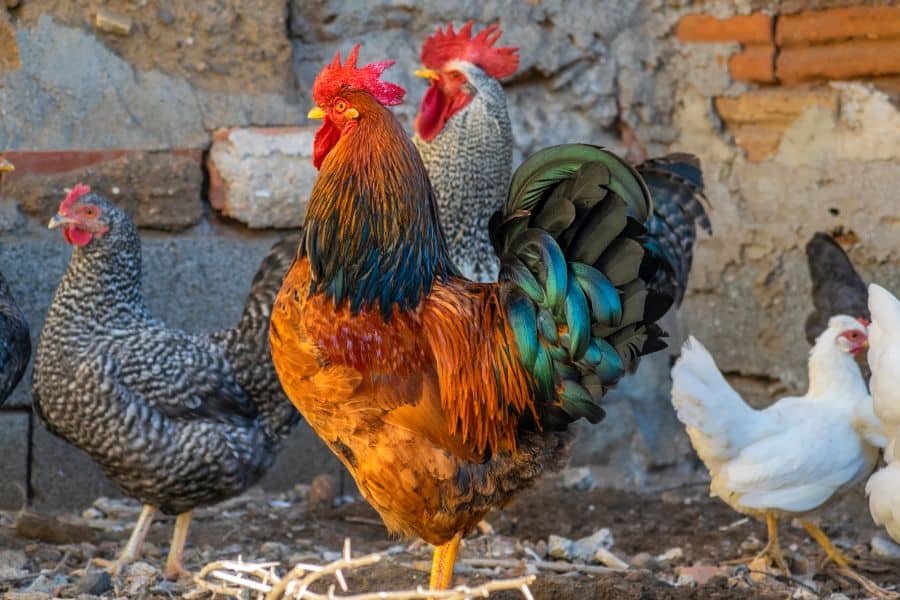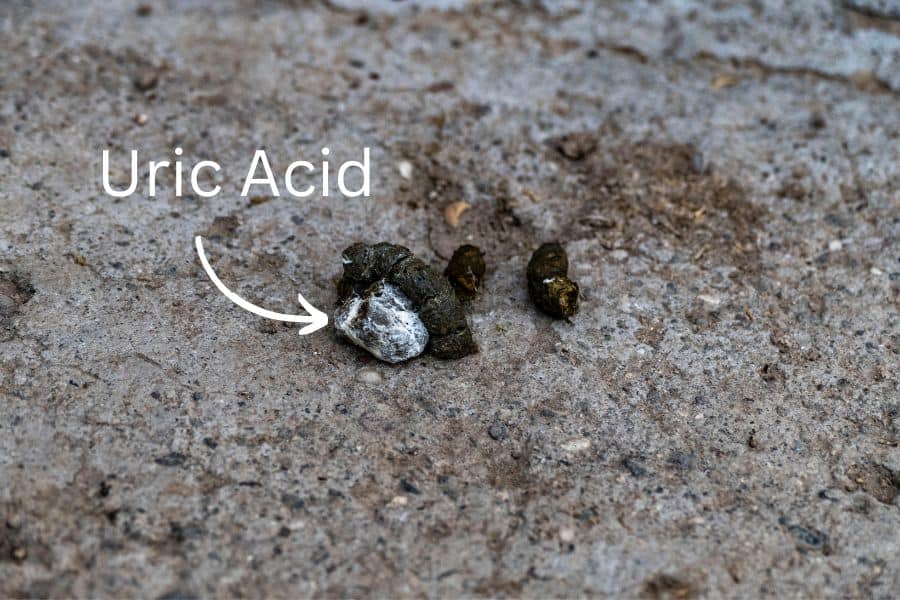Of all the animals you’re likely to find around a farm, chickens and other poultry are the only ones you won’t see peeing. More precisely, they are the only ones you won’t see expelling waste in a liquid form when healthy.
The issue of how chickens expel waste is one that has baffled human beings for generations. Many theories as to how exactly chickens expel waste have been proposed over the years but most people have simply accepted that chickens don’t pee.

However, chickens are animals and like any other animal, they must expel the waste that is generated during certain bodily processes. Thanks to many years of research, we now know that the answer to this question is not a simple yes or no.
The excretory system of chickens and other birds is a marvel that enables them to expel waste despite lacking one well-known part. Read on to find out how your chickens may have been peeing and why it is important for you to keep track of this.
What is Urination?
According to the Oxford Dictionary, urination refers to the act by which urine is expelled from the body. Some definitions go further by stating that it is the expulsion of urine from the urinary bladder.
Going by the first definition, we can say with certainty that chickens pee because, just like humans, chickens produce urine which is expelled from the body. However, chickens and other birds don’t have urinary bladders so some sticklers may say that they don’t actually pee.
We may never reach a universal consensus on whether chickens urinate. The most important idea to take from this is that contrary to many beliefs, chickens produce urine, and this urine is expelled from the body, just not in a manner many consider conventional.
What is the Significance of Peeing in Chickens?
The question of whether chickens pee may seem like an inconsequential one to some but to those who work or live with animals, it is important. Among other things, the act of peeing and the nature of the urine can give you a glimpse into the health status of an animal.
Urination is the process through which waste can be removed from an animal’s body. This waste can be the byproducts of the digestion of what was consumed or toxic waste that has made its way into the body through other means.
When your chicken pees, just like you, they are getting rid of waste products that could otherwise cause harm to their bodies.
The process by which your chickens eliminate this waste can be interrupted, e.g., if your chicken is constipated or egg-bound. In such cases, without quick intervention, this inability to pass waste can be fatal to your chicken.
How Exactly Do Chickens Pass Urine?
Chickens don’t have bladders so they cannot urinate like humans and farm animals like cows and dogs. Chickens and other poultry have a more interesting way of going about their business.
The bodies of birds remove unused nitrogen by converting it into uric acid. This is different from the bodies of humans where the excess nitrogen is instead converted into urea.
The process of converting excess nitrogen into uric acid uses more energy but the upside for birds is that it also uses less water. Additionally, the resulting product is not as heavy as liquid urine.
The uric acid is in the form of solid crystals, and these are deposited on top of the solid waste i.e., poop before it is expelled through the chicken’s cloaca. This is the white layer that is usually seen sticking to chicken poop.
This means that while in humans the expulsion of undigested food and expulsion of metabolic waste from the kidneys are separate processes, in chickens these processes take place at the same time. This leads to the next question which is do chickens even have kidneys?
Excretory Systems of Chickens
Chickens do have kidneys and they constitute a larger percentage of their body weight compared to our own kidneys. Chickens have two kidneys, each with a ureter that independently transports the urine formed in the kidney to the cloaca.
The kidneys are such a vital component in your chicken’s health that should they become damaged and unable to function normally, the chicken will die quickly. In chickens, the kidneys perform three important functions:
- Elimination of waste products from the digestion of food, especially excess nitrogen.
- Keeping the electrolyte levels balanced in the chicken’s body.
- Balancing the amount of water present in the chicken’s body.
One interesting fact is that when the urine passes to the cloaca, it is not immediately expelled from the chicken’s body. The urine is first moved back to the large intestines so that the excess water in it can be reabsorbed by the chicken.
The reabsorption of water helps the chicken to use water more efficiently and also makes the urine more concentrated. This is why the white deposit on top of the chicken’s poop is in the form of a paste.
How Often Do Chickens Pass Urine
Chickens pass their urine at the same time as their fecal matter. This means that chickens pass urine many times on any given day.
Some sources state that chickens will poop as many as 15 times in a single day while other sources put the number at once every 30 minutes. Regardless of what the exact number is, the most important fact is that chickens will poop and pass urine at a very high rate.
Because chickens poop so frequently, they only release a small amount of waste at any given time. There is one key exception to this that you should be aware of, brooding chickens.
When some chickens are sitting on eggs, they will instinctively know not to poop where they’re sitting. Therefore, such brooding hens will leave their eggs once or twice a day so they can do their business elsewhere.
If you’ve ever come across a particularly large stack of chicken poop that, perhaps, stinks worse than usual, it’s probably from one of the brooders. This is perfectly normal and healthy, and they will go back to regular pooping/peeing after the brooding period passes.
Problems Associated with Urine in Chickens
When your chickens’ kidneys are not functioning normally, a range of health problems can emerge. Something as simple as providing your chickens with a diet that is too rich in protein can increase the amount of uric acid in the blood beyond the kidneys’ capacity.
Chickens can also suffer from gout which is a condition where urates and uric acid are deposited in the animal’s tissue instead of being sent to the cloaca. Gout can be caused by kidney diseases but can also be caused by the chicken’s diet.
Dietary issues that can lead to gout in chickens include:
- Too much cholesterol
- Low phosphorous
- Too much protein
- Too much calcium
- Dehydration
One of the symptoms that your chickens may have a kidney problem is polyuria. This is when the urine part of the chicken poop is greater than usual.
Polyuria is not the same as diarrhea because the fecal matter won’t have a liquid consistency but will instead have a high amount of clear liquid around it.
The increased amount of urine doesn’t always indicate a kidney problem as it can also be caused by other issues.
Uses of Chicken Urine
Urine is a very important component of chicken manure. It adds a substantial amount of nitrogen and other substances to the droppings.
Due to the high nitrogen content of the droppings, chicken manure is very good for soils that have low levels of nitrogen. No other farm animal’s manure has higher levels of nitrogen, potassium, and phosphorus than chicken.
If you have a small garden in addition to your chickens, the manure from your chickens can be excellent for keeping your soil healthy. However, you should be aware that certain pathogens can also be transmitted through this waste from your chickens.
Myths About Chickens Peeing
Because chickens are not observed peeing like other farm animals, some myths have come up in the past regarding how chickens pee. One such myth is that chickens pee through their skins.
The truth is that chickens don’t release any fluids through their skins and don’t even have sweat glands. This means there is no chance your chickens are urinating through their skins.
As discussed earlier, chickens have kidneys that send the urine to the cloaca where it is expelled together with the fecal matter.
Also Read:
Conclusion
The fact that chickens don’t pee in a way that is visible and understandable to humans has made this topic one that comes up regularly. In many cases, it has simply been accepted that chickens don’t pee.
However, as we have seen, chickens produce urine like any other animal but like other birds and reptiles, they don’t have a bladder. The urine produced by chicken is expelled through the animal’s cloaca along with the feces.
This method of expelling waste by birds is said to have come about because it is more advantageous to flight. Whether or not this is accurate, it still means that chickens pass urine just like other animals.
The urine produced by chickens can tell you a few things about the health of the chicken if you know what to look for. Additionally, some of the components of the urine make the manure from chickens very healthy for certain types of soils.
Although there are myths about how chickens pee, the facts are much more straightforward, and understanding them can help you to raise healthier and happier chickens.

